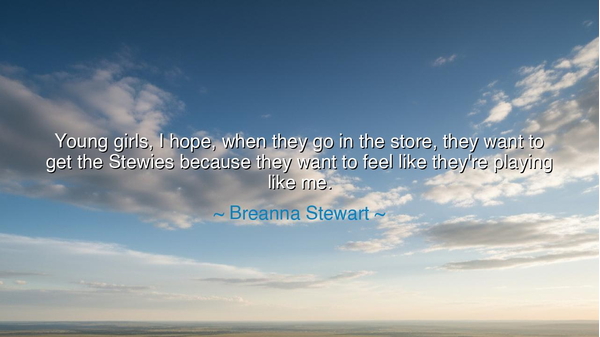
Young girls, I hope, when they go in the store, they want to get
Young girls, I hope, when they go in the store, they want to get the Stewies because they want to feel like they're playing like me.






“Young girls, I hope, when they go in the store, they want to get the Stewies because they want to feel like they're playing like me.” Thus spoke Breanna Stewart, one of the great champions of modern basketball—a woman whose strength, grace, and vision have transcended the boundaries of sport itself. Her words, though simple, carry a power that echoes beyond the court, a call to a generation of young dreamers to see themselves reflected in greatness. For in this statement lies not vanity, but legacy—the desire to kindle courage in the hearts of those who will come after, to make them believe that what she achieved is not distant or divine, but possible.
To the ancients, the greatest heroes were not those who fought merely for their own glory, but those who inspired others to rise beyond limitation. Stewart’s words belong to this same spirit. In speaking of her shoe—the “Stewies”—she does not boast of a product, but of representation. For generations, young girls walked into stores filled with shoes that bore the names of men: Jordan, LeBron, Curry. They were told, without words, that greatness was masculine, that the stories of triumph belonged to others. But in this new age, Stewart stands among the pioneers who have rewritten that narrative. Her wish is simple and profound: that young girls, upon seeing her name, might also see themselves, and believe that their dreams, too, are worthy of history.
It was once said by the philosopher Aristotle that excellence is not an act, but a habit—formed through courage, persistence, and vision. Breanna Stewart embodies this truth. Her path to greatness was not a road paved with ease, but one of trials and tests: injuries that could have ended her career, battles against doubt and expectation, the fight for recognition in a world that often overlooks women’s achievements. Yet through it all, she rose. She became not only a champion of the game, but a symbol of the cause—the equality of opportunity, the empowerment of women through visibility and excellence.
We might recall the story of another trailblazer—Billie Jean King, who once stood before the world and demanded that women’s sports be valued equally. In her time, the idea that girls could inspire nations through sport was dismissed as fantasy. Yet through courage and excellence, she proved that passion knows no gender. Stewart’s quote arises from this same lineage of pioneers—those who fought not only to win titles, but to win hearts and futures. Her shoes, therefore, are more than fabric and rubber; they are a symbol, a bridge between what was and what can be.
The heart of Stewart’s message beats with something even deeper than fame—it beats with the power of example. She wishes for the young girl who laces up her Stewies not merely to imitate her game, but to feel her spirit: the belief that greatness is born from discipline, the confidence to dream without apology, the joy of mastery born through work. To “play like me,” in Stewart’s sense, means to play with courage, intelligence, and heart—to play as though every moment is a chance to honor the generations who came before, and to light the way for those yet to come.
And herein lies the eternal truth that the ancients too would recognize: that legacy is not in possessions, but in inspiration. A sword, a scroll, a shoe—these are but symbols of the spirit that wields them. It is not the object that endures, but the example. Breanna Stewart’s hope is the same as that of all who have walked the heroic path: that her triumph might not end with her, but awaken in others a hunger for excellence, for confidence, for belief. In this, her words are not about commerce, but about continuity—the unbroken chain of courage passed from one generation to the next.
So, my friends, take from her this lesson: live in such a way that your victories give birth to the dreams of others. Whatever your field—art, science, teaching, or sport—strive not only for personal success, but for the upliftment of those who watch and follow. Let your work, your courage, and your integrity be the “Stewies” you leave behind—symbols that others may wear with pride, feeling, if only for a moment, that they too can “play like you.” For in this lies the truest form of immortality: not to be remembered for what you achieved, but to live on through what you have inspired.
Thus, in the spirit of Breanna Stewart, let us remember that greatness is not complete until it multiplies itself in others. To light one candle is to dispel a single shadow; to light many is to change the world. May every young girl who ties her laces and steps onto the court remember that she is not walking in another’s footsteps—she is continuing a sacred journey, carrying the flame forward, and writing her own name upon the walls of time.






AAdministratorAdministrator
Welcome, honored guests. Please leave a comment, we will respond soon